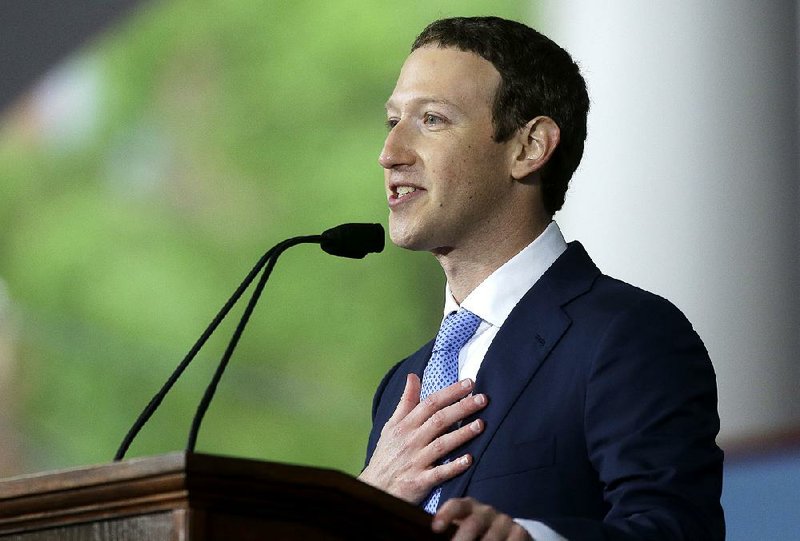WASHINGTON -- Under growing public pressure to reveal more about the spread of covert Russian propaganda on its site, Facebook said Thursday that it was turning over more than 3,000 Russia-linked ads to congressional committees investigating the Kremlin's influence during the 2016 presidential election.
"I care deeply about the democratic process and protecting its integrity," Facebook's chief executive, Mark Zuckerberg, said during an appearance on Facebook Live, the company's video service. He added that he did not want anyone "to use our tools to undermine democracy."
"That's not what we stand for," he said.
The announcement that Facebook would share the ads with the Senate and House intelligence committees came after the company spent two weeks facing calls for greater transparency about the 470 Russia-linked accounts that it took down after they had promoted inflammatory messages on divisive issues.
[RUSSIA REPORT: documents on Russian interference in election ]
Facebook had previously shown congressional staff members a sample of the ads -- some of which attacked Democratic nominee Hillary Clinton or praised Donald Trump -- but had not shared the entire collection.
Facebook's disclosure Sept. 6 that Russian agents covertly bought ads on the site during last year's presidential campaign drew intense scrutiny on the social network and Twitter, entangling both companies in the investigation by Robert Mueller, the special counsel, and raising the possibility of future regulation of political advertising on their platforms. Congressional Democrats asked the Federal Election Commission this week to devise ways to prevent foreign influence on U.S. elections, including possible new laws or regulations.
On Thursday, Zuckerberg vowed that Facebook would be "more transparent" and outlined a list of actions that the company planned to take in the weeks ahead about political advertising. Those included revamping how the company treats such ads on the social network.
Each ad, he said, would show which Facebook Page -- a kind of account required for businesses to create an ad -- had paid for the ad, although that would not necessarily identify the people behind the Facebook Page. In addition, Facebook plans to invest more heavily in its security teams, expand its coordination with global election commissions and work closely with other tech companies to share threat information as it arises.
In his seven-minute talk from Facebook's headquarters in Menlo Park, Calif., Zuckerberg also noted that it was his first day back from parental leave after the birth of a daughter. Still, he had the look of a young leader addressing his people at a moment of crisis.
With his talk of "the democratic process," "foreign actors," and "election integrity" -- in Germany as well as in the United States -- Zuckerberg underscored Facebook's status as a transnational behemoth whose power reaches into every corner of contemporary life.
"We are in a new world," he said. "It is a new challenge for Internet communities to deal with nation-states attempting to subvert elections. But if that's what we must do, we are committed to rising to the occasion."
Zuckerberg also hinted that the company may not provide much information publicly, saying the ongoing federal investigation will limit what he can reveal.
"As a general rule, we are limited in what we can discuss publicly about law enforcement investigations, so we may not always be able to share our findings publicly," he said.
The nonpartisan Campaign Legal Center stressed again Thursday that the company should make the ads public, "so that everyone can see the nature and extent of the use of Facebook accounts by Russia."
Sen. Mark Warner of Virginia, the top Democrat on the Senate Intelligence Committee, praised Facebook's announcement but said he still believed regulation was needed to ensure that voters know more about who is behind ads on social media.
"This is a good first step," he said. "I'm disappointed it's taken 10 months of raising this issue before they've become much more transparent."
Warner said he believed the 3,000 ads, which the committees had not yet received, should be made public with protections for the privacy of any innocent people whose names may be in the material.
Warner and Sen. Amy Klobuchar, D-Minn., circulated a letter inviting colleagues to co-sponsor a bill that would require greater transparency for online political ads, according to a copy of the letter seen by The New York Times.
Rep. John Sarbanes, D-Md., chairman of a group called the Democracy Reform Task Force that is tracking the Russian interference, said it was urgently necessary to understand Russia's actions and prevent a repeat in future campaigns.
"We're telling the FEC, let's get going on this, because the 2018 election is bearing down on us," he said.
Twitter, which has kept a low profile since Facebook's disclosure of the Russian intrusion, said it will privately brief the Senate Intelligence Committee on Wednesday.
"Twitter deeply respects the integrity of the election process, a cornerstone of all democracies, and will continue to strengthen our platform against bots and other forms of manipulation that violate our Terms of Service," the company said in a statement.
The Times reported this month that Russian intelligence appeared to have been behind an infestation of Twitter automated accounts, called bots, that spread messages against Clinton last year. Cybersecurity company FireEye identified what it called "warlists" of hundreds of fake accounts that fired off identical political messages.
The Times also found Facebook accounts that appeared to have been created by ordinary Americans but were actually concocted by Russian agents. Facebook, which had said as recently as July that it had found no evidence of fraudulent Russian ad purchases, said earlier this month that it had removed the 470 profiles and pages that it said were linked to the Internet Research Agency, a Russian company with Kremlin ties.
Information for this article was contributed by Scott Shane and Mike Isaac of The New York Times; and by Barbara Ortutay, Tom Lobianco and Chad Day of The Associated Press.
A Section on 09/22/2017
